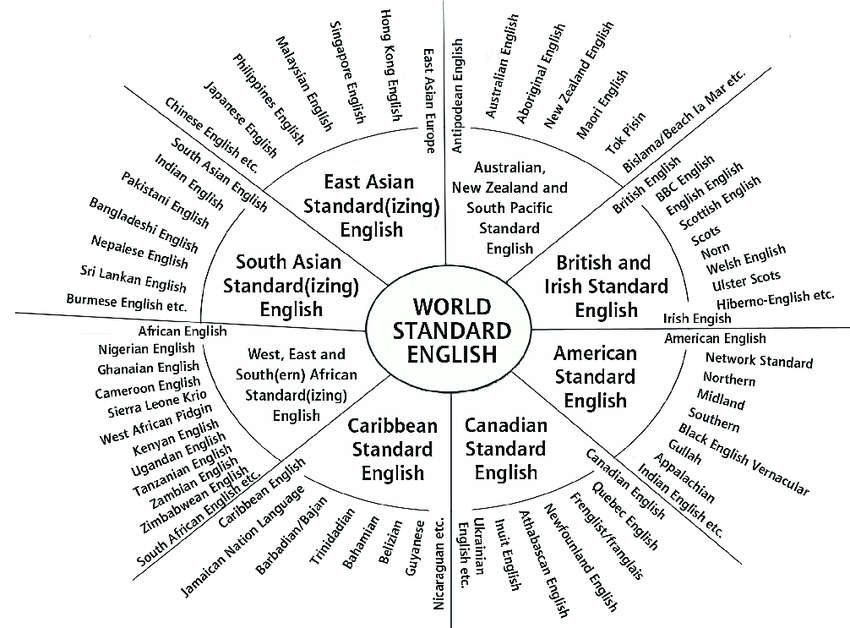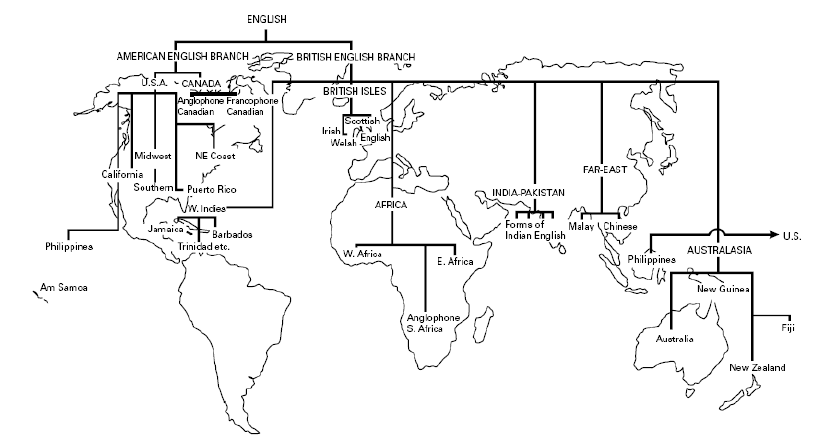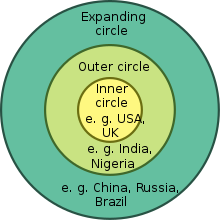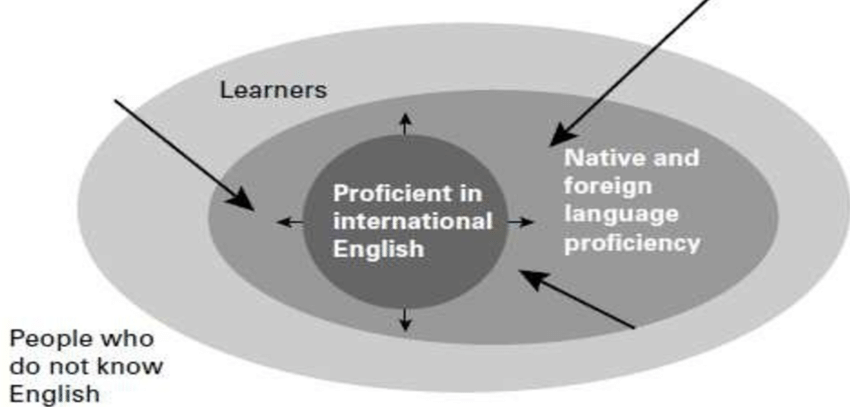CIE A2 Level English: English in the World
World Englishes: varieties of English that have arisen due to colonialism spoken by people in post-colonial societies; fails to describe the contexts for the use of English in the world

McArthur’s Circle of World Standard Englishes categorizes English in its geographical regions. However, its limitations are in its lack of historical or political linkage.
Hong Kong English, while being part of the East Asian Standard(ising) English category, has more links with British and Irish Standard English
Historically, Britain wanted more control over their trade with China. During the First Opium War, they successfully seized Hong Kong and took control of the country from 1842 (in a treaty made by the Qing Dynasty) to 1997.
Philippines English, while being part of the East Asian Standard(ising) English category, has more links with American Standard English
Historically, Spain had ruled over the Philippines from 1565 to 1898. When they were defeated in the Spanish-American War, they ceded it to the United States in the Treaty of Paris
The USA controlled the Philippines from 1898 to 1946 when they gained independence
World Englishes have developed as a result of countries adopting English as a language and accommodating (cultural accommodation theory) for other speakers in the same country.

Streven’s model of the Spread of English is much like McArthur’s Circle of World Standard Englishes, but overcomes the lack of historical context that McArthur foregoes by expressing the roots of each English variant.
Philippines English is part of the American English branch unlike in McArthur’s circle
However, it doesn’t take into account English varieties that developed from local vernacular languages; it only assumes that English developed with roots in either British or American English.
Pidgins: a form of contact language that act as a lingua franca; made up of elements of different languages
Pidgins are a type of communication adopted by people who share no common language.
in the Caribbean, pidgin languages developed due to the history of slavery
West African people were shipped to the USA and Caribbean forcibly during the slave trade period (Atlantic Slave Trade: 1526 to 1867). They were forced to work on plantations
12.5 million men, women, and children were put on ships but only 10.7 million arrived in the Americas
The slaves were divided from those who spoke the same language to deter rebellion. Within these groups, the slaves who were multilingual and could also speak English developed a contact language to communicate
Once a pidgin becomes a native language, creole is developed and a wider vocabulary and more complex grammar is picked up
Creolisation: the formation of two (or more) different languages to form a new distinct variety of language
Creoles can be developed like other varieties of English around the world. In Jamaica, creole exists in a range of forms along a continuum from Standard Jamaican English (acrolect) to the basilect with the mesolect in the middle.
Acrolect: a term used to refer to a standard or official language variety in contexts where creole is spoken
Basilect: referring to the most informal style that speakers use
Mesolect: a middle style of language between standard and colloquial varieties
Pidgins and creoles are often viewed as inferior forms of language due to their historical context.
‘broken english‘
However, creoles have a wider range of vocabulary and grammar, often due to inheriting many characteristics of ‘full‘ languages. Thus, they are able to communicate more effectively at any given time and change fairly quickly; it is more practical and functional.
New Englishes: varieties of English that have arisen through government administration, education, and media rather than from native language speakers; coined by Platt, Weber, and Ho
American English
Puritans were the first European settlers in 1620 in what is now known as the United States. They spoke English.
The Puritans adapted their English based on the conditions they lived in. They discarded words no longer relevant or useful and added new lexis in return. They adopted Native American lexis such as ‘raccoon‘, ‘squash‘ for pumpkin, and ‘moose‘. However, not very many Native American lexis was adopted into American English.
American English has mainly borrowed from European countries and beyond. Overall, American English is a ‘melting pot‘ of peoples and their languages.
Netherlands and Dutch: coleslaw, cookies
Germany and German: pretzels, delicatessens
Italy and Italian: pizza, pasta, pepperoni etc.
The new American English lexis that developed after the American War of Independence in 1783 were as follows:
break-even
bottom line
blue chip
white collar
commuter
freeways
subways
parking lots
mergers
downsizing
Much of the new American English lexis were concerned about business.
English as a lingua franca: English as a common language (‘bridging‘ language) between speakers of other languages; fails to acknowledge the variety of world Englishes
English is the lingua franca of many countries, sometimes becoming the second official language. It dominates government, education, communication, science, and technology. 75% of the world’s mail and 80% of global information is written in English.
Global English: the idea of English as a global language, represents the extensive scope of English use in modern times; fails to recognise the variety of world Englishes, assuming there is one unified form of English
English is known as a global language due to:
large amount of speakers
geographical range
political and economic significance
Though, the idea of global English is being challenged. The predicted economic growth in the next 50 years could lead to other languages becoming a global language such as Chinese, Spanish, and Arabic.
International English: the idea of English as a language used in all international contexts
English is currently the world’s second largest language spoken with 1.5 billion to 2 billion speakers worldwide; its largest competitor is Chinese/Mandarin with 960 million speakers. English is the first language of 375 million people, mostly in the UK.
Standard English, also known as British English, originated in the UK and has origins in the Oxford/Cambridge regions. This is due to the well-known universities that still exist today. Standard English is associated with an accent known as received pronunciation (RP).
3% of the British population use RP; often used by teachers, academics, politicians, influencers, and the upper-class
Margaret Thatcher and Tony Blair, both former prime ministers of the UK, used Standard English to become more popular during elections. This is known as language shift.
Language shift: a process where a speech community gradually stops using one of its two languages in favour of another, especially when it offers greater advantages
If a language has no perceived advantage for employment and general advancement, then the language may only be used by the older generations and not taught to the younger generations. This gradual process leads to language death.
Previously, Latin was the global language of the world. Now, English has developed this importance in the last thousand years due to:
the Industrial Revolution
colonisation of other countries such as America, Guam, New Zealand, Canada
English as the main language of the United Nations, NATO, and all political diplomacy
music, film, and media
large companies e.g Apple operating in English
internet
Language does not exist in a vacuum; the growth of different global languages often reflects both the geography and history of different speaking groups.
There have been many attempts to create a single world-wide language. Esperanto is a known artificial universal language with an estimate of 3 million speakers but has made no significant difference to the national languages of the world.
While Standard English is still prominent, it is known to be ‘posh‘ and overtly formal. New forms of Standard English have evolved:
Estuary English — spread from the Thames Estuary
glottalisation e.g ‘buh-uh‘ from butter
‘th‘ can be replaced for either ‘f‘ or ‘v‘ e.g mouth → mouf, mother → muvver
removal of ‘ly‘ from adverbs e.g ‘You’re moving too quick(ly)’
African America Vernacular English (AAVE)
lexically unique words e.g crib, homey
reduction of consonants if followed by another consonant e.g west side → ‘wes side’
‘th‘ can be replaced for ‘d‘ e.g this → dis
Chinglish — Chinese with English
South African English
borrowings from African languages in the region e.g tsetse, tsotsi, kgotia, marula
borrowings from other settlers e.g atchar, bobotie, sosatie, kaparrang, and kramat from Malaysia
words from British settlement that are not used in the same context now e.g robot for traffic light
Standard vs. Non-Standard English and Received Pronunciation (RP)
Standard English: the form of English that is widely recognised and accepted as the ‘correct‘ form of English; gone through much standardisation and follows the accepted constructions of the language
Standard English originated in the UK as the variety of English spoken in the politically and economically powerful triangle between Oxford, Cambridge, and London. It is generally perceived as the variety of English spoken by educated people.
Non-standard English: the ‘informal‘ version of English containing colloquialisms and slang; considered not socially acceptable
H.C Wylde, 1914; other English dialects are “of very little importance“ and are “quaint and eccentric“
Received pronunciation (RP): the standard form of British English pronunciation, based on educated speech in southern England, widely accepted as a standard elsewhere; it is seen as an indicator of status rather than being linked to a geographical area
Those who spoke with RP were often sent to British public schools (expensive fee-paying schools; what are now known as private schools) and grew up to become influential members of society. Their social circles would often mix and therefore, adopt speech patterns from one another.
The British Broadcasting Company (BBC) adopted RP for their media and it was the only accent heard on television and radio. It was known as ‘the voice of Britain‘.
Nothing about RP makes it more superior to other accents. Only social attitudes towards RP has made it prestigious. Nowadays, RP is seen as old-fashioned.
Multilingualism
Multilingualism: the ability to speak two or more languages
David Crystal: “Speaking two or more languages is the natural way of life for three-quarters of the human race. [This] principle … has been obscured in parts of Europe as a consequence of colonial history. We urgently need to reassert it, and to implement it in practical ways, for, in the modern world, monolingualism is not a strength but a handicap.“
In other languages, being able to speak English was impressive due to the destinations it could get you; if you spoke English, you could attend Harvard, or Oxford University.
Some jobs such as hospitality, tourism, and retail often prioritise hiring those who are able to speak another language so that the language barrier is not an issue when attracting more customers.
Reasons for Language Development Change
Languages, much like English, grow for a variety of reasons:
colonialism
There is also an idea called language steamrollers, coined by scientist Jared Diamond, where one group that has advantages over population, food supply, or technology, then they are able to impose their language
David Crystal: “Power always drives language.“
media e.g film, music
travel and tourism
scientific and technological advancements
There is some concern over English becoming fragmented (linguistic fragmentation) and split into mutually incomprehensible languages much like Latin did. Though, English’s influence over the globe is still quite strong.
More than 6,000 languages are spoken throughout the world, but 23 languages account for more than half the world’s population. As English and other languages have grown, others have gone extinct. 6% of the world’s languages are spoken by 94% of the world’s population.
Linguistic imperialism: imposing a dominant language on people who speak (often minority) different languages; linguistic imperialism leads to control of a country’s political, economic, and social institutions
UNESCO does note five levels of language endangerment:
vulnerability — children speak, but languages have a restricted domain
definitely endangered — children have not learnt language as it is not the mother tongue nor is it used at home
severely endangered — language is spoken by grandparents and older generations; parents may understand it, but they don’t speak it with the children or only use it amongst themselves
critically endangered — youngest speakers are grandparents and older; used partially
extinct — language is no longer spoken
Language death: the disappearance of a language when all speakers of the language cease to speak it due to various factors such as;
threats
pressure
persecution e.g the Aboriginal population of Tasmania were wiped out within 75 years by the Europeans
invasive species e.g diseases passed from members of other countries to the native population
language attrition (losing their native language)
Scottish Gaelic was only spoken in the remote areas of the northern and Western Highlands of Scotland, with 20,000 native Gaelic speakers worldwide
The Gaelic Language (Scotland) Act of 2005 gave official recognition to the language
a school was opened in Glasgow with its lingua franca being Scottish Gaelic
there has been a large boost in spending for BBC Gaelic language broadcasting services, such as BBC Alba and BBC Radio nan Gaidheal
Language death can be prevented by:
revitalisation; creating cultural appreciation events
education; using it in teaching younger generations, make learning the language more accessible to the public
documentation; writing the language down in official documents
normalisation; using it in everyday speech, in road/public signs
Charles Hagege: “What we lose is essentially an enormous cultural heritage, the way of expressing the relationship with nature, with the world, between themselves in the framework of their families, their kin people.“
While the future of English as a global language is not on the decline, other languages may grow if their native countries also grow in influence and power.
Kachru’s Concentric Circles Model
Developed by Braj Kachru in 1985, his circles model is used to describe the circumstances in which English is spoken.

Inner Circle | Outer Circle | Expanding Circle |
|---|---|---|
norm-providing | norm-developing | norm-dependent |
English is the native language of most people in these countries | English is the second language for these people | no historical or government role |
English dominates communication i.e in administration, social purposes | history of colonialism | medium of international communication for a specific purpose |
little enthusiasm to learn other languages | serves as a lingua franca | relies on standards set by norm-providing countries |
traditional bases of English | used in administration, higher education, national commerce, legislature, and ceremonies | English is a foreign language |
has approximately 380 million speakers | has approximately 500 million speakers | has approximately 1000 million speakers |
countries include the UK, US, Australia, New Zealand, Ireland, parts of Canada, South Africa, some Caribbean countries | countries include India, Nigeria, Bangladesh, Pakistan, Malaysia, Tanzania, Singapore, Kenya, parts of South Africa | countries include China, Russia, Japan, some parts of Europe, Korea, Egypt, Indonesia |
While Kachru’s circles have become a popular way to study the spread of English in various countries, they fail to recognise each individual in the country; they assume that every English speaker in a country is the same. It does not take into account educated individuals who are fluent in English but live in a norm-dependent country.
Modiano’s Centripetal Circles Model
In response to Kachru, Marko Modiano in 1999 developed his centripetal circles model. Modiano’s centripetal circles are a way to describe the status of English as an international language.
Unlike Kachru, the model focuses on the individual speaker rather than their geographical location(s).

The centre circle is where speakers who are proficient in ‘international English’ are categorised.
These people have no strong regional accent or dialect
They are able to communicate well cross-culturally with little to no difficulties
The outer circle is where speakers who speak English as a first or second language are categorised.
These people have learnt English with strong regional variations
They are able to communicate well with those who speak their variation as a native or foreign language
They are not fluent in ‘international English‘
The next circle is where speakers who are still learning English are categorised. Their proficiency with English is still low, whether it be as an ‘international English‘ or a regional variation.
The outermost band are those who do not know English at all.
However, despite its lack of geographical stereotypes, it still lacks a clear distinction between what is ‘international English‘ and ‘standard English‘.
English as an Imperialist Language: What is the future of English?
Anne Pakir coined the term killer language which suggested that a dominant language eventually leads to the death of minority languages (linguistic imperialism).
The idea of a ‘killer language’ was then developed by linguist Robert Phillipson in his book Linguistic Imperialism published in 1992. He describes how English in the 21st century has dominated other languages and has consequently lead to the control of a country’s social, political and economic institutions.
When a language dominates, it can have a detrimental effect on local languages which, in turn, suggests that these other languages are deemed as less important as a means of communication and transmission of culture.
The decline and death of a language results in the diminishment of the culture of those who speak it as a mother tongue. Examples of this include Welsh & the Welsh Knot and Te Reo Maori in New Zealand.
English has taken this role as a global language, as seen in Papua New Guinea;
Colonised by both Britain and Australia, a creole language (Tok Pisin) was developed to improve the native people’s economic wellbeing
Other native languages were not seen to offer the same economic advantage and ceased to be spoken
Tok Pisin and English coexist as the lingua franca in Papua New Guinea
Suzanne Romaine, 1992: “to speak English was good; to speak Tok Pisin was bad, but to speak Tok Ples [the local language] was worse“
However, English’s dominance and being a killer language is not always true, as seen in Germany;
German is an established language in Europe
Germany is part of the European Union where much of the business is conducted in English
Many Germans speak both German and English fluently, especially as English appears in modern media and music
In TESOL (Teaching English to Speakers of Other Languages), there has been a call to teach less Anglocentric English and more culturally sensitive English. As said by UNESCO in a 2016 report, “education policies should recognise the importance of mother-tongue learning“.
However, English could still be under thread by:
internalisation of digital forms; texting, emails, and emoticons produce a language form that is international rather than English-based
illiteracy of its speakers and writers; there are frequent news items about graduates who are unable to use English fluently
the idea of all forms of English having equal validity could develop as separate languages
mass migration of non-English-speaking populations to cities may create large areas where English is not spoken
focus for technological and economic growth may pass from the US-Western Europe axis to Asia, especially China and the Pacific
Framework | FAVO CHIPPS |
|---|---|
Future of English | how does the text describe the future of English? Is it positive? Is it negative? |
Acceptance of Standard/Non-Standard English | how does the text describe the acceptance of Standard or Non-Standard English? |
Varieties | how does the text describe the acceptance of different varieties of English? |
Opportunities | how does the text describe the opportunities with which speaking English has? |
Communication | how does the text describe the spread of English in various forms? |
History | what is the history behind English in the context of the text? |
Identity | how does the text describe what identity speaking English gives you? being forced to speak English? |
Policy (government) | how does the text describe various issues of English in the world? |
Power | how does the text describe what power speaking English gives you? |
Status | how does the text describe what status speaking English gives you? |
Crystal
movement of English around the world
expansion of the British empire → a fifth of the world’s land occupied by Brits and a quarter of the world’s population being exposed to English
post-WWI → expansion of the American empire
colonisation
reasons to speak English → opportunity
English is the language of business
English is the language of Hollywood
English is the language of popular music
English is the language of Shakespeare and the most widely-read literature
English is the language of simplicity
English is the language of versatility and sophistication
English is the language of travel
English is the language of the internet
English is the language of America and international relations
English is the language of social status
four-fifths of interactions in English are between non-native speakers
a quarter of the world’s population competent in English
Englishes and varieties
conflict, emotional trauma, identity
future of English
Phillipson
English is a form of neo-imperialism
identity
opportunities being limited
English is a business venture to further English-speaking countries
whether language is being pushed or pulled by the people speaking it
Functional
people expressing themselves through English
adopting and adapting
Substratum
Cultural transmission